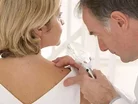5 ways the medical community is spreading skin cancer awareness

As the threat of skin cancer continues to grow, doctors and hospitals across the country are spreading the word about the dangers of skin cancer.
From encouraging checkups to educating the public on prevention, the medical community is serious about skin cancer.
Here are just a few ways medical professionals are getting vocal about skin cancer dangers.
RELATED TOPIC: Hereditary Cancer: Know Your History, Know Your Risks
Skin cancer statistics
It's unfortunate but true; millions of Americans are diagnosed with skin cancer each year.
In fact, according to the Skin Cancer Foundation, nearly 3.5 million people are diagnosed with skin cancer each year in the U.S. alone.
In addition, 5 million people are treated for skin cancer in the U.S. each year as well.
Many cases are treated through simple procedures, but many aren't.
Melanoma is the most dangerous type of skin cancer and also one of the most invasive to treat.
The Skin Cancer Foundation estimates there will be more than 70,000 new cases of melanoma in the U.S. in 2015. Of those cases, more than 9,000 people will die as a result of melanoma.
With statistics like these, it's no wonder doctors and hospitals are keeping the public informed about the dangers of skin cancer.
Skin protection recommendations
The medical world is keeping the public informed on the most up-to-date skin protection practices available.
The article Concerned About Your Health? Consider These Coconut Oil Benefits describes coconut oil as a natural anti-ager and skin moisturizer. This can be used in combination with high SPF sunscreens to keep skin healthy and prevent skin cancer.
In fact, the medical community is heavily promoting the use of SPF 30 and 50 sunscreens.
Likewise, doctors and hospitals are also recommending people stay out of the sun when the UVA and UVB indexes are at their highest. By following these recommendations, the public can significantly reduce the chances of skin cancer.
Facts and statistics
More and more medical professionals are spreading the word about skin cancer by sharing facts and statistics. When presented with real numbers, the public will begin to realize how common skin cancer actually is in the United States.
From facts on the dangers of tanning to melanoma statistics in men and women to skin cancer rates by ethnicity, doctors and dermatologists are providing their patients with hard facts.
By doing so, the medical community is hoping the public will start taking skin care more seriously.
RELATED TOPIC: 3 Pharmaceutical Giants on the Road to Curing Cancer
Checkups
During checkups, doctors are taking a closer look at their patients' skin conditions. If they see a suspicious mole or discoloration, doctors are recommending their patients see a dermatologist.
In addition, dermatologists are also encouraging the public to examine their skin regularly and schedule checkups whenever they find an area of concern.
Self-exam techniques
The medical world is spreading the word about self-exam techniques that can help the public detect signs of skin cancer early.
From the ABCDEs of Melanoma exam to the Ugly Duckling Sign technique used to determine which spots are cancerous and which aren't, dermatologists are getting the public on board with skin cancer awareness.
When it comes to the dangers of skin cancer, the medical community is doing all it can to vocalize its concerns to the public.
About the author: Adam Groff is a freelance writer and creator of content. He writes on a variety of topics including cancer awareness and personal health.
- Manufacturers Unite in the Battle Against Breast CancerMedical Devices & Pharma
- Thirona’s AI Tech is Creating Individualised Patient CareTechnology & AI
- HPV Vaccine 'Protects Males from Cancers' - Global ReportMedical Devices & Pharma
- Hologic: How Can Technology be Harnessed to Combat Cancer?Technology & AI





